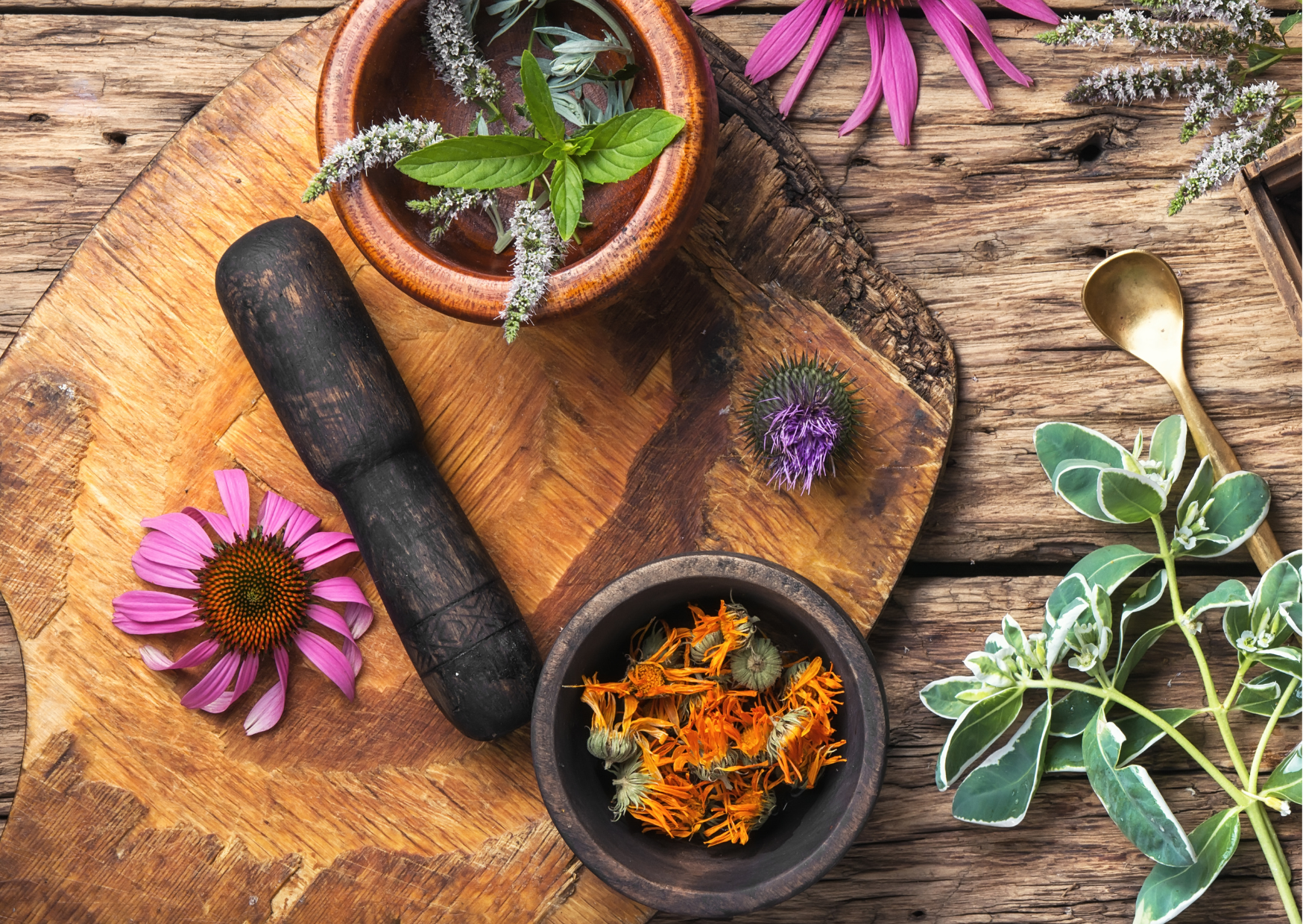Herbalistic Menopause Management
Always consult with a professional (holistic herbalist and doctor)
Menopause is defined as the time when a woman's menstrual periods permanently stop, marking the end of fertility. It usually occurs naturally between the ages of 45-55. With menopause, estrogen levels decline, leading to symptoms like hot flashes, night sweats, vaginal dryness, trouble sleeping, mood changes, and slowing metabolism.
The conventional medical approach to menopause often focuses on managing symptoms with hormone replacement therapy. However, herbs and other natural remedies can provide an effective and holistic alternative for navigating menopause.
A holistic herbal approach views menopause as a natural transition in a woman's life, not a disease state needing treatment. Herbs offer safe options to find balance, restore hormonal equilibrium, and address troubling symptoms. With the right herbs and lifestyle adjustments, women can pass through menopause gracefully while supporting overall health.
The key benefits of a holistic herbal approach include:
• Herbs work gently with the body's natural processes
• Whole-body support beyond just symptom relief
• Empowering women to take an active role in their transition
• Avoiding side effects of medications
• Options suitable for long-term use
• Non-invasive and non-synthetic options
This guide will explore science-backed herbal remedies to provide women a natural way to thrive during menopause.
Common Symptoms of Menopause
The transition into menopause can bring about various symptoms caused by decreasing estrogen levels. Some of the most common symptoms include:
- Hot flashes - Sudden feelings of intense body heat, flushing of the face and sweating, often at night. Hot flashes can range from mild to severe and frequent.
- Night sweats - Episodes of excessive sweating and hot flashes occurring at night, which can disrupt sleep. Night sweats tend to be more common in perimenopause and early menopause stages.
- Vaginal dryness - Declining estrogen causes thinning and drying of the vaginal walls. This can lead to irritation, discomfort, pain during intercourse and increased risk of infection.
- Mood changes - Menopause hormones directly impact mood regulation. Many women report irritability, anxiety, sadness, fatigue, trouble concentrating and memory lapses.
- Sleep disturbances - The combination of night sweats, hot flashes and changing hormones can impair sleep. Insomnia and frequent waking are common complaints.
The intensity and frequency of symptoms varies widely among women. While some may have minimal issues, others can be significantly impacted. Understanding the common symptoms helps women know what to expect and identify solutions.
Holistic View of Menopause
Menopause is a natural transition in a woman's life, not a disease that needs to be treated. From a holistic perspective, menopause provides an opportunity to focus on self-care and make positive lifestyle changes to support physical, mental, and emotional wellbeing.
The holistic view recognizes menopause as a normal rite of passage, much like adolescence. Hormonal changes lead to both physical and emotional symptoms, as the body adjusts to decreasing estrogen levels. This natural transition brings shifts that extend beyond the physical. Menopause is a time of psychological change and spiritual growth.
Rather than focusing on relieving isolated symptoms with medication, the holistic approach looks at optimizing health and wellness throughout the whole menopausal transition. This means addressing diet, exercise, stress management, social connection, self-care practices and other lifestyle factors that contribute to overall wellbeing.
With some reflection and experimentation, women can discover what lifestyle adjustments help them feel their best emotionally and physically during perimenopause and beyond. The goal is to embrace menopause in a positive way, taking charge of one's health and not just reacting to changes as they arise. This outlook empowers women to thrive in midlife and beyond.
Herbal Remedies for Hot Flashes
Hot flashes are one of the most common symptoms of menopause, affecting over 75% of menopausal women. While hormone replacement therapy was once the go-to treatment, many women today prefer to take a more natural, herbal approach to finding relief from hot flashes and night sweats. Several herbs have been studied for their potential to reduce the frequency and severity of hot flashes.
Black Cohosh
Black cohosh (Actaea racemosa, Cimicifuga racemosa) is one of the most well-researched herbs for menopausal symptoms. It has been used for centuries by Native Americans for women's health. Black cohosh does not contain hormones, but it may support the body's ability to regulate its own hormones. Studies show it can reduce hot flashes and night sweats. The exact mechanism is unknown, but it may bind to serotonin receptors or have Phyto estrogenic effects.
Red Clover
Red clover (Trifolium pratense) contains isoflavones, which are phytoestrogens similar in structure to human estrogen. By acting on estrogen receptors, red clover may help reduce hot flashes and balance hormonal changes during menopause. Research shows it can decrease hot flash frequency and severity. Red clover also provides antioxidants and may support heart and bone health.
Dong Quai
Used for over 1,000 years in Traditional Chinese Medicine, dong quai (Angelica sinensis) remains one of the most popular herbs for treating menopausal symptoms. It does not contain hormones but has antispasmodic effects that may help reduce hot flashes. Dong quai also acts as a blood tonic and supports circulation. Studies indicate it may provide modest relief from hot flashes when combined with other herbs.
Evening Primrose Oil
Evening primrose oil provides gamma-linolenic acid (GLA), an omega-6 fatty acid that may help moderate hormonal activity. Some studies show evening primrose oil can decrease hot flash frequency and severity. It may also relieve breast pain. The beneficial effects may result from its anti-inflammatory properties and ability to improve the balance of reproductive hormones.
Ginseng
Ginseng has long been used in traditional medicine to treat menopausal symptoms. It contains active compounds called ginsenosides that may have estrogen-like effects in the body. Research suggests ginseng may reduce hot flashes and mood symptoms in menopausal women. However, study results are mixed, and more research on optimal dosing is needed.
Herbal remedies can provide safe, natural relief from hot flashes and night sweats during menopause. They are best used under the guidance of a knowledgeable herbalist or naturopathic doctor who can recommend formulas and doses tailored to your individual needs. Lifestyle factors like managing stress, eating healthy, and exercising regularly also play an important role.
Herbal Remedies for Mood Support
The transition through menopause can be an emotional rollercoaster for some women. Fluctuating hormone levels during perimenopause and menopause can cause mood changes like anxiety, irritability, sadness, and trouble focusing. Herbal remedies may help provide calm and balance.
- St. John's Wort: This herb has been shown to help relieve mild to moderate depression. The compounds in St. John's Wort may increase serotonin, dopamine, and noradrenaline levels in the brain to lift mood. Take 300-900 mg daily.
- Lavender: Lavender essential oil or tea made from lavender buds has a calming effect. Lavender contains antioxidants and aromatic compounds like linalool that may boost mood. Diffuse lavender oil or drink lavender tea as needed for anxiety relief.
- Chamomile: Chamomile has been used for centuries as a mild sedative to reduce anxiety, irritability, and trouble sleeping. Chamomile tea contains apigenin, a flavonoid that binds to benzodiazepine receptors in the brain. Sip chamomile tea several times per day.
- Rhodiola: This adaptogenic herb can enhance mood and mental clarity while reducing stress and fatigue. Rhodiola increases serotonin and dopamine levels. Take 200-600 mg of Rhodiola extract each day.
- Ashwagandha: Ashwagandha is an Ayurvedic herb traditionally used to balance mood and reduce stress. With powerful adaptogenic properties, ashwagandha helps moderate cortisol levels. Take 300-600 mg of concentrated ashwagandha root extract daily.
Mood swings are common during the menopausal transition. Herbal remedies like St. John's wort, lavender, chamomile, Rhodiola, and ashwagandha can provide women with natural mood support. Always consult your healthcare provider before taking any herbs or supplements.
Herbs for Hormonal Balance
Hormonal changes are central to the experience of menopause. Herbs that support hormonal balance can help ease some of the most difficult symptoms of menopause. Here are some of the top hormonal balancing herbs:
Maca
Maca is an adaptogenic herb traditionally used in Peru to enhance energy and balance hormones. It contains unique nutrients called macaenes and macamides that may help support hormone production in the body. Studies show maca can reduce hot flashes, depression, anxiety, and sexual dysfunction in menopausal women. The optimal dose of maca is 1,500-3,000 mg taken daily. Start with a lower dose and work up slowly over a few weeks to assess tolerance.
Licorice Root
Licorice root contains beneficial plant compounds like glabridin and glycyrrhizic acid that help regulate cortisol and progesterone levels in the body. Cortisol and progesterone need to be properly balanced for women to avoid menopausal symptoms. Licorice also reduces hot flashes and helps naturally balance estrogen levels. Drink licorice root tea or take 300-500 mg of licorice root extract daily.
Shatavari
Shatavari is a revered Ayurvedic herb used traditionally to support female hormonal health. Modern research shows it acts as a phytoestrogen, providing estrogenic activity that can help regulate hormonal balance. It also increases levels of luteinizing hormone, which signals the ovaries to produce progesterone. Shatavari effectively relieves hot flashes, vaginal dryness, irritability, and mood swings during menopause. Take 2,000-5,000 mg of the herb daily. Seek organic shatavari products to ensure purity and effectiveness.
A combination approach using these hormonal balancing herbs alongside diet, lifestyle, and stress reduction tactics can help women smoothly transition through menopause. As always, consult your healthcare provider before taking any new herbs to ensure safety and compatibility with any medications or medical conditions.
Herbs for Healthy Bones
As estrogen levels decline during menopause, this can impact bone health and lead to conditions like osteoporosis. Thankfully, there are many herbal remedies that can help support bone strength.
- Horsetail is rich in silica, calcium, and other minerals that help increase bone density and strength. Horsetail helps the body absorb and use calcium more efficiently. Many herbalists recommend horsetail tea or supplements to protect bone health during menopause.
- Nettle is another mineral-rich herb that is great for bones. It contains calcium, magnesium, potassium, silica, and boron. Nettle supports the structure of bones and may prevent loss of bone density. Nettle can be consumed as a tea, tincture, or capsule.
- Red clover contains phytoestrogens that mimic estrogen in the body. Since estrogen helps maintain strong bones, red clover may help slow bone loss during menopause. Red clover is available in teas, tinctures, and supplements. However, consult your doctor before using red clover if you have a history of breast cancer or are taking medication.
- Alfalfa is high in vitamin K and phytoestrogens, both of which are beneficial for bone strength. Vitamin K is especially important, as it improves calcium absorption. Alfalfa can be found in tablets, powders, teas, and sprouted seeds. Pair it with vitamin D for optimal bone support.
Incorporating these bone-strengthening herbs into your daily regimen can help maintain a healthy skeleton as you transition through menopause. When combined with a nutritious diet and weight-bearing exercise, these herbs may prevent osteoporosis and reduce fracture risk. Be sure to consult your healthcare provider before taking any new herbs or supplements.
Lifestyle Changes
Making healthy lifestyle changes can help ease menopause symptoms and promote overall wellbeing. Here are some tips:
- Diet - Eat a balanced, nutrient-dense diet. Increase intake of fruits, vegetables, whole grains, legumes, healthy fats like olive oil and avocado. Avoid processed foods, excess salt, sugar, and unhealthy fats. Stay hydrated by drinking adequate water.
- Exercise - Engage in regular physical activity like walking, swimming, or strength training for 30-60 minutes most days. This helps manage weight, boosts mood, improves sleep and heart health.
- Stress management - Try relaxation techniques like mindfulness, deep breathing, and meditation. Make time for hobbies, connect with others, and get enough rest. This reduces anxiety and stress.
- Kegel exercises - Perform Kegel exercises regularly to strengthen the pelvic floor muscles. This helps with urinary incontinence that may occur during menopause.
- Yoga and meditation - Practices like yoga, tai chi and meditation help improve flexibility, strength, balance, and relaxation. This alleviates menopause symptoms.
- Social support - Don't go through menopause alone. Connecting with other women experiencing menopause can provide emotional support and advice for coping with symptoms. Consider joining a menopause or women's health support group.
Making positive lifestyle changes can significantly improve quality of life during menopause transition and beyond. Focus on self-care by nourishing your body and mind.
When to Seek Medical Care
While holistic and herbal approaches can provide relief for many symptoms of menopause, it's important to know when to seek medical care from a doctor. Here are some key times when medical attention is recommended:
If symptoms like hot flashes, night sweats, mood changes, and vaginal dryness are severe and disrupting your daily life, speak to your doctor. They may recommend prescription medications or other medical treatments to relieve severe symptoms. Don't hesitate to seek help if the symptoms are greatly impacting your quality of life.
Any vaginal bleeding after menopause is not normal and should be evaluated by a doctor. Postmenopausal bleeding can be a sign of uterine cancer or other gynecological conditions that require medical diagnosis and care. Seek prompt medical attention for postmenopausal vaginal spotting or bleeding.
If you have a family history of early menopause (before age 45), inform your doctor. You may need additional monitoring and testing to check hormone levels or screen for any associated health risks. A family history of early menopause increases your risk.
While holistic remedies can complement medical treatment, they should not replace professional care if symptoms are severe or concerning. Track your symptoms and don't hesitate to consult a doctor if your condition warrants medical attention. With a balanced approach, you can find the right solutions to manage menopause symptoms and continue thriving.
Menopause is a natural transition that all women go through, but that doesn't mean it has to be endured without support. Taking a holistic herbal approach can provide natural relief from common menopausal symptoms and foster balance and wellbeing during this change.
The herbs and lifestyle changes covered in this article can help mitigate troublesome symptoms like hot flashes, night sweats, irritability, anxiety, and insomnia. Herbs like black cohosh, soy isoflavones, red clover, and chasteberry have been shown to gently support hormonal fluctuations in a way that promotes comfort. Other herbs like oat straw, horsetail, alfalfa, and stinging nettle provide bone-protective nutrients for ongoing health.
Making diet and lifestyle adjustments to reduce stress, inflammation and promote restful sleep also complement an herbal approach. With the right natural tools, women can move through menopause feeling empowered in body and mind. The remedies here offer a proactive way to care for yourself during this transition.
We all must go through menopause at some point. By educating yourself on the holistic herbal options and trying different remedies, you can discover what works best to minimize discomforts and support wellbeing. Menopause is an opportunity to connect with and care for yourself in new ways. Be open, be patient, and explore how herbs and mindfulness practices can help you thrive.


